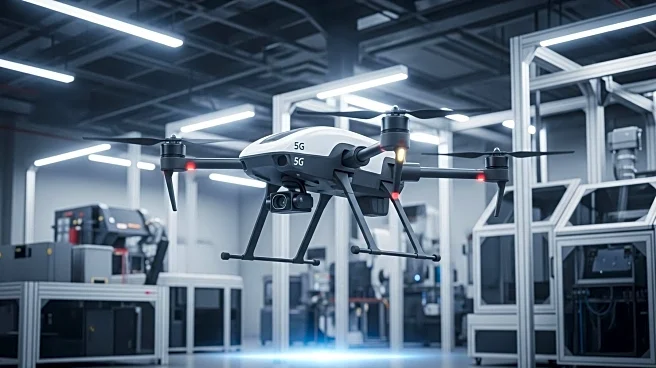What's Happening?
Indonesian telecommunications company XLSmart, in collaboration with ASTRAtech, has introduced an autonomous 5G drone designed for goods delivery within the manufacturing sector. This innovative solution, developed by XLSmart's innovation lab X-Camp, incorporates AI and IoT technologies to enhance logistics efficiency. The drone features live camera streaming over 5G for real-time monitoring and computer vision technology for precise delivery point recognition and safe landings. The initiative aims to address common distribution challenges faced by manufacturers, such as employment restrictions and delivery route difficulties, while promoting cost and time efficiency. The project received research support from ASTRAtech and drone manufacturer Bentara Tabang Nusantara.
Why It's Important?
The introduction of 5G-enabled drones in manufacturing logistics represents a significant advancement in industrial automation and efficiency. By reducing shipping costs and accelerating distribution, manufacturers can enhance productivity and expand their reach to areas inaccessible by traditional transport methods. This development also contributes to environmental sustainability by reducing carbon footprints. The collaboration between XLSmart and ASTRAtech highlights the growing importance of integrating advanced technologies like AI and IoT in industrial processes, potentially setting a precedent for other sectors to adopt similar innovations.
What's Next?
ASTRAtech plans to extend the application of this drone technology beyond manufacturing, targeting sectors such as infrastructure, construction, agribusiness, and mining. This expansion could lead to broader adoption of autonomous drones across various industries, further driving efficiency and innovation. The ongoing collaboration between XLSmart and ASTRAtech may also result in new technological advancements and solutions tailored to specific industry needs, fostering growth within the Astra Group ecosystem.
Beyond the Headlines
The deployment of autonomous drones raises considerations regarding regulatory compliance and safety standards, particularly in congested or restricted areas. As the technology becomes more widespread, there may be increased scrutiny on privacy and data security, given the drones' capabilities for real-time monitoring and data collection. Additionally, the shift towards automation could impact employment in traditional logistics roles, necessitating workforce adaptation and potential retraining initiatives.











